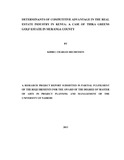| dc.description.abstract | Real Estates development industry is recognized globally for taking a critical role in
social, political and economic development. The real estate industry plays a
significant role in providing employment opportunities, enhancing income
distribution and alleviating poverty all over the world. However, the real estate
industry in Kenya continues to fail to fulfill this fundamental role due to a number of
unique factors that affect investment sustainability in the sector. The study targeted a
sample of 209 respondents out of which 152 respondents gave their responses giving
a response rate of 73%. The aim of this study was to examine the factors that
determine the Competitive Advantage in Real Estate industry in Kenya with specific
reference to Thika Green Limited (TGL) in Muranga County. The key factors which
the researcher put under investigation were entrepreneurial skills, marketing
strategies, product differentiation strategies and product location and its proximity to
infrastructures. The key objective of the whole study was to find out how the above
key factors determine the Competitive Advantage in the real estate’s industry in
Kenya. Key research questions of the study were how the entrepreneurial skill does
determine the Competitive Advantage of the Real Estate industry in Kenya? How the
various marketing strategies adopted by Real Estates developers in Kenya, especially
Thika Greens Limited, determine the Competitive Advantage of the Real Estate
industry in Kenya? To what extent does a product differentiation strategy influences
the performance of the Real Estate industry in Kenya? How proximity to key
infrastructure does determine the Competitive Advantage of the Real Estate industry
in Kenya? The researcher adopted descriptive research in the study because this was a
qualitative research. The target population was 2082 authenticated land owners who
had started developing their Plot. Out of this 209 was selected as a sample size. Data
was collected through Structured and Non Structured Questionnaires and Face to
Face Interview. The researcher used SPSS tool to analyze the data after they were
collected. The study concludes that entrepreneurial skills had the greatest effect on
the Competitive Advantage of TGL followed by physical location, then marketing
strategies while product differentiation had the least effect on the competitive
advantage of TGL. The study found out that the development of infrastructure
promoted the real estate development performance by motivating the customers to
invest in the sector. This study therefore recommends that there is need to invest in
infrastructure such as roads, water and sewerage in order to promote the
competitiveness of the real estate businesses in Kenya. The study further recommends
that advertisement should be enhanced as a tool of marketing by real estate
developers in Kenya as it can contribute to great success of the projects | en |

